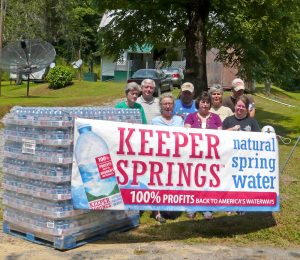On September 14th, a conference was held with Hearing Officer Blanton in the Office of Administrative Hearing case brought by the Kentucky Energy and Environment Cabinet against Nally & Hamilton. The conference determined whether Appalachian Voices, Kentuckians for the Commonwealth, Kentucky Riverkeeper, and Waterkeeper Alliance, represented by Natural Resources Defense Council attorneys, may continue with legal proceedings as intervenors in the case. Unfortunately for Appalachian Voices and the citizens of Kentucky, the results of the hearing will allow the Cabinet to continue making deals with Nally & Hamilton behind closed doors.
This case is the Cabinet’s response to the Notice of Intent to sue Nally & Hamilton for 12,000 violations of the Clean Water Act, filed in March 2011 by Appalachian Voices and its partners. To address the violations identified by Appalachian Voices, the Cabinet settled with Nally & Hamilton for $507,000 in fines, topping the previous record-setting fines issued in Appalachian Voices’ other on-going cases against big coal in which Frasure Creek and ICG coal companies were fined $310,000 and $350,000, respectively.
Though these fines represent a great step toward holding coal companies accountable for the pollution they create, the fines are still insufficient. Under Kentucky law, Nally & Hamilton could be fined as much as $300 million for the 12,000 violations. The recognition that the Cabinet consistently does not adequately enforce the law is one reason Appalachian Voices and its partners stepped in as intervenors in the Cabinet’s case. Once the Cabinet and Nally & Hamilton proposed a token settlement in the case they then filed a motion for a continuance. In the conference, the Hearing Officer granted the motion for continuance, based on his determination that he did not have authority to require more discovery in our case.
Those of you without a legal degree are probably wondering what all of this means. I’ll do my best to explain – in short, the Cabinet continues to shield the coal companies, without adequate prosecution. The continuance effectively halts legal proceedings – in this case, it halts discovery, or our ability to request further documentation and other evidence from Nally & Hamilton and the Cabinet, which would likely strengthen and clarify our case. We will still be allowed to submit comments on the Agreed Order between the Cabinet and Nally & Hamilton before the order is sent to the Cabinet Secretary for review.
Besides filing the motion for continuance, the Cabinet has attempted to undermine our involvement in other ways as well. The Cabinet failed to respond to any of our discovery requests, despite the responses being due in August. Because of this, we have been unable to determine the facts the Cabinet considered when entering into the settlement with Nally & Hamilton. We do not know how fines were determined, what violations were identified, or how thorough an investigation was conducted.
The Clean Water Act violations that were identified indicate that pollution is being under reported and inaccurately reported. This improper reporting harms Kentucky’s waterways and the health of Kentucky’s citizens. The Cabinet failed to identify most of these violations until they were uncovered by Appalachian Voices. Despite the Hearing Officer’s request to the Cabinet and Nally that they include Appalachian Voices and its partners in the settlement negotiations, the Cabinet completed a closed-door settlement with Nally & Hamilton and is attempting to prevent further action by us. The current settlement provides a relatively low monetary penalty, does not provide for true stipulated penalties for future violations, ignores the potential of intentional fraud, and claims to resolve Nally’s liability for all previous violations of “the same type” despite there being no evidence the Cabinet bothered to identify different types of violations.
It is obvious the Cabinet is taking the side of big coal in this case. The settlement clearly does not provide for effective, ongoing protection of the people of Kentucky from corporate coal abuses. Kentucky citizens deserve better than this from their state officials.
















 Appalachian Voices and its partners previously sued two other coal companies late last year in a legal case that has had as many twists and tangles as an errant patch of kudzu. That case currently has a court date set of June 14.
Appalachian Voices and its partners previously sued two other coal companies late last year in a legal case that has had as many twists and tangles as an errant patch of kudzu. That case currently has a court date set of June 14.

